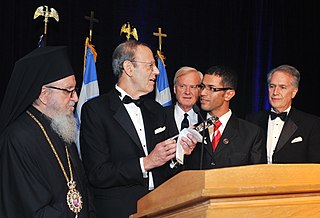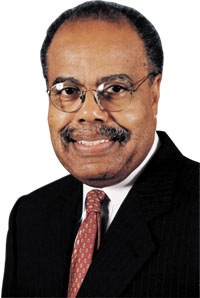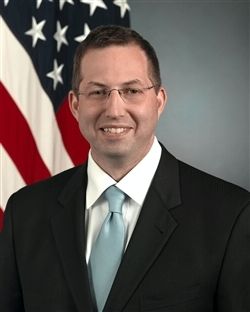
The National Endowment for Democracy (NED) is a quasi-autonomous non-governmental organization in the United States founded in 1983 with the stated aim of advancing democracy worldwide, by promoting political and economic institutions, such as political groups, trade unions, free markets, and business groups.

Richard Charles Albert Holbrooke was an American diplomat and author. He was the only person to have held the position of Assistant Secretary of State for two different regions of the world.

Winston Lord is a retired American diplomat. As Special Assistant to the National Security Advisor and then as Director of Policy Planning at the United States Department of State, Lord was a close adviser to Henry A. Kissinger and was instrumental in bringing about the renormalization of U.S.-China relations in the 1970s.
Morton H. Halperin is an American analyst who deals with U.S. foreign policy, arms control, civil liberties, and the workings of bureaucracies.

Robert Edward White was an American career diplomat who served as US Ambassador to Paraguay (1977–1980) and to El Salvador (1980–1981). He then became president of the Center for International Policy.

Donald Franchot McHenry is a former American diplomat. He was the United States Ambassador and Permanent Representative to the United Nations from September 1979 until January 20, 1981.

William Joseph Burns is an American diplomat and the director of the Central Intelligence Agency (CIA) during the Biden administration since March 19, 2021. He previously served as U.S. deputy secretary of state from 2011 to 2014; in 2009 he served as acting secretary of state for a day, prior to the confirmation of Hillary Clinton. Burns retired from the U.S. Foreign Service in 2014 after a 32-year career. From 2014 to 2021, he served as president of the Carnegie Endowment for International Peace.

Stephen Warren Bosworth was an American academic and diplomat. He served as Dean of The Fletcher School at Tufts University and served as United States Special Representative for North Korea Policy from March 2009 to October 2011. He served three times as a U.S. Ambassador, to Tunisia (1979–1981), to the Philippines (1984–1987), and to South Korea (1997–2001). In 1987, he received the American Academy of Diplomacy's Diplomat of the Year Award.
The American Academy of Diplomacy is a private, nonprofit, non-partisan, elected organization whose active membership is limited to men and women who have held positions of high responsibility in crafting and implementing American foreign policy. They have served the United States as chiefs of mission in major embassies abroad, and/or equivalent high-level foreign policy positions in Washington.

James Franklin Collins is a former United States Ambassador to Russia. A career Foreign Service Officer in the State Department, he is a Russian specialist.

After the United States established diplomatic relations with the People's Republic of China (PRC) in 1979 and recognized Beijing as the only legal government of China, Taiwan–United States relations became unofficial and informal following terms of the Taiwan Relations Act (TRA), which allows the United States to have relations with the Taiwanese people and their government, whose name is not specified. U.S.–Taiwan relations were further informally grounded in the Six Assurances in response to the third communiqué on the establishment of US–PRC relations. The Taiwan Travel Act, passed by the U.S. Congress on March 16, 2018, allows high-level U.S. officials to visit Taiwan and vice versa. Both sides have since signed a consular agreement formalizing their existent consular relations on September 13, 2019. The US government removed self-imposed restrictions on executive branch contacts with Taiwan on January 9, 2021.

Kenneth Ian Juster is a veteran American diplomat, who served as the United States Ambassador to India from 2017 to 2021. He is currently senior counselor at the global law firm Freshfields Bruckhaus Deringer, senior adviser at the institutional investor CDPQ, strategic adviser at the software company Salesforce, and distinguished fellow at the Council on Foreign Relations.

Richard Rahul Verma is an American diplomat, who serves as the deputy secretary of state for management and resources, a position he has held since April 5, 2023. He served as the assistant secretary of state for legislative affairs from 2009 to 2011, and as the U.S. ambassador to India from 2014 to 2017. He served as the chief legal officer and head of global public policy at Mastercard, from 2020 to 2023, and as the vice chair of the Asia Group from 2017 to 2020, where he oversaw the firm's South Asia practice. He also practiced law for many years at Steptoe & Johnson LLP in Washington DC, and served as a Senior Counselor and Lead of the India and South Asia practice at Albright Stonebridge Group.

James William Pardew Jr. was an American diplomat, international negotiator, military officer, and United States Ambassador to Bulgaria. After serving as a military intelligence officer in the United States Army for 28 years, Pardew entered the arena of international diplomacy with a heavy focus on the Balkans, where he was instrumental in coordinating agreements and peace resolutions, as well as heading major State Department programs such as the Bosnian Train-and-equip program.

Fredrick F. Chien, or Fred Chien, Chien Foo, is a retired Taiwanese diplomat and politician who served as the President of the Republic of China Control Yuan from 1999 to 2005. After graduating from Yale University, he assumed a series of governmental positions include Director-General of the Government Information Office from 1972 to 1975, Republic of China Representative to the United States from 1982 to 1988, Chairman of the Council for Economic Planning and Development from 1988 to 1990, and Minister of Foreign Affairs from 1990 to 1996. He was also the Speaker of the National Assembly between 1996 and 1999.

Douglas Haines Paal is vice president for studies at the Carnegie Endowment for International Peace, where he directs the endowment's Asia Program. He served as the director of the American Institute in Taiwan from 2002 to 2006 and worked on the National Security Council staffs of Presidents Reagan and George H. W. Bush between 1986 and 1993 as director of Asian Affairs, senior director, and special assistant to the President. He was vice chairman of JPMorgan Chase International from 2006 to 2008. He also serves as a member of the board of trustees of the Asia Foundation.

Carl Gershman served from 1984-2021 as the founding president of the National Endowment for Democracy (NED), a private, congressionally-funded, grant-making institution that supports non-governmental groups working for democracy around the world. During his presidency, NED’s annual congressional appropriation grew from $18.5 million in 1984 to $300 million a year in 2021, when it funded nearly 2,000 projects in 100 countries.

Derek James Mitchell is an American diplomat with extensive experience in Asia policy. He was appointed by President Barack Obama as the first special representative and policy coordinator for Burma with rank of ambassador, and was sworn in by Secretary of State Hillary Clinton on October 2, 2011. On June 29, 2012, the U.S. Senate confirmed him as the new United States Ambassador to Burma. On September 4, 2018, Mitchell succeeded Kenneth Wollack as president of the National Democratic Institute, a position he served until September 2023.

Kin Wah Moy (born 1966) is an American diplomat and holds the diplomatic rank of career minister. He is the first Chinese-American to hold the post as director of the American Institute in Taiwan. Having served in the Department of State and several diplomatic outposts, he began his tenure as the director of the American Institute in Taiwan, the de facto embassy of the United States in Taiwan, in June 2015.

The Taiwan Travel Act is an Act of the United States Congress. Passed on February 28, 2018, it was signed into law by President Donald Trump on March 16, 2018. As a follow-up to the Taiwan Relations Act, the bill allows high-level officials of the United States to visit Taiwan and vice versa.

















